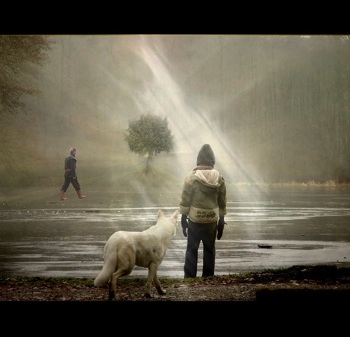I’ve been working on a new ebook about recovery and came across this early post on lost feelings. It resonated with me so I thought I would post it again in this revised version.
A breakthrough to healing can come at the most unexpected time. The other night I was trying to divert myself by watching a mystery episode from an old British series. Instead of taking my mind off things, this story pushed me into a part of my history I had long kept at a safe distance.
The film built its story around a soldier haunted by his experience of violent death in Bosnia, especially the sight of a basement floor piled deep with the corpses of women and children. Much later, after his return to civilian life, the shock of another act of violence brings back the Bosnian memories and plunges him into such an intense guilt that he loses his power of speech.
A minister, he takes on the guilt for these horrors that have nothing to do with his own actions. He is even driven to seek atonement for them by confessing to a killing he did not commit.
The story was inspired by Pat Barker’s fine novel, Regeneration, about a World War I combat veteran slowly brought back to health through the efforts of a gifted psychiatrist. These stories bring to life the hard work of recovery.
Certain dramatic scenes often have powerful resonance for me, often triggering grief and tears, but I have never been able to understand what was going on. Why should such powerful feelings fill me in response to fiction?
I could see reasons for such reactions when brought on by the real-life stories of veterans suffering complete collapse from the traumas of combat. However, I thought of that more as empathy for their suffering rather than as response to my own far less violent family disturbances. The other night, though, things began to get clearer.
I could finally feel that a gradually unfolding childhood in a family full of anger, blocked love, passive abuse, the refusal to show affection. I lived through all of it in a prolonged losing battle, a slow-motion shock. Over and over again, I took in the message that I didn’t measure up, couldn’t do things in quite the right way.
I didn’t take sides in the bitter arguments, the fist fights, the threats, sometimes involving guns, even when I was attacked for failing to do so. Even though unable to find acceptance from parents too wrapped up in their own sharp-edged disappointments, I could do the one thing that comes naturally to many kids: imagine that I was responsible for everything that was wrong.
I took all the destructiveness on myself and found myself guilty of failing to set everything right. Not only that, I was guilty of being a coward, running from battle, a scared soldier trying to hide from confrontation. Instead of jumping into the combat, I watched it passively as it played out in front of me. It seemed to go by like an endless movie in which I had no role.
Of course I was guilty, deserving scorn for emotionally side-stepping the raging feelings around me. There were times when I played the part of the bad kid and did small things I could really feel ashamed of – petty vandalism, lies, cheating. If everything else had failed, perhaps being bad would meet my parents expectations and win me a perverse place in their lives.
Repression is an unconscious thing, a costly mercy. A great trauma hits, especially when you’re young, and something clicks. Mind and feelings hide the whole thing away.
In this case, I managed to get through the violent, angry scenes by losing awareness of most of the intense feelings, the hurt, the rage that must have been there. The only feelings I felt at the time were guilt and fear.
In time that part of my past receded more and more. I grew so distant from all feelings about my family that I could joke about the chaos with college friends after I had moved away and no longer had to deal with home life. Home itself disappeared as the family split up. Emotionally, the past became a non-event. It was taken care of without need for a thought, for a feeling, certainly not for the persistent guilt of childhood. Problem gone.
Many years later, something finally began to break open, and I could feel with the intensity I had pushed below memory. Mostly, though, the feelings rising to the surface came out only in the form of a deep grief. At first that baffled me – where was this coming from?
I well remembered all the events of growing up but emotionally could not make the connection. I would just be moved to tears by stories about the losses and triumphs of others, their guilt, their regeneration into life, but not mine.
For a long time, I didn’t know what it was I’d lost. There were only the grief and the tears that surged out unexpectedly.
Then I read Peter Kramer’s line in Against Depression that grief is not a common thing for severely depressed people since their feelings are so blunted and inaccessible. Grief is linked to resilience, to whatever life force is left to fight off suicide, to refuse, ultimately, to let your life be lost to this illness. It is a sign that life is flickering back up, that something good is finally coming from all that shutting down.
The story on film unlocked grief about the past, not guilt. Grief for what? Perhaps for everything lost, every bit of rage and hurt I might have let loose at the time, the loss of love, the hurt in the whole family – I still can’t get it quite clear in mind – though it’s clear enough in feeling.
Some of these intense moments came back to me when I listened to the music of John Hiatt, who knows this experience so well:
I’ve cried till the past nearly drowned me
…
And I need to cry 30 years or so
These are tears from a long time ago
Are there breakthrough moments of reconnecting with your past that you could discuss here?



John, your experience with repressed grief sounds a lot like mine. It surely wasn’t safe to have any feelings as a child because I either got laughed at or yelled at. For me, it wasn’t just repression, it was dissociation – I still to this day can’t remember many things from my childhood. I think now I can FEEL what it was like and there is a certain degree of “knowing” what happened. I think the same scenario played out so many, many times that it all became one, big blur and condensed into one or two memories.
I, too, had to come to the realization that even though I felt responsible for everybody, I didn’t have the power to do anything and I can’t fix it now, either. My parents are still living and still pretty much the way they were then and I’ve had to detach in a different way in order to not go crazy. I feel a sadness for my dad, oddly enough, as he was the one who was the most violent, so sometimes that feels confusing. I don’t hate them, but I often wonder if I’ll feel anything when they die. Maybe relief, sad to say.
Hi, Judy –
Dissociation is a good word to capture what I often experienced as well. I think a lot of kids must do it to cope – being in the midst of violence of any type but hollowing yourself out and removing your feelings to another place. Being there but not being there. It’s strange how persistent the unmet needs of childhood are and how long we keep trying to get them met from parents who never noticed or cared about the damage they were doing in the first place. What you say about the memories blurring together into one or two is interesting. Apparently a lot of us with depression do that in looking back – the most vivid memories are the most painful and they are generalized and become the dominant memories of childhood. My memories of that period today are actually a lot different than they were a few decades ago.
John
I understand this process — when I was writing The Youngest Light last year, I thought I was writing one kind of story (namely, my struggles with / through depression) and I started with specific memories that I believed shaped that journey. Then the book came out completely differently than what I was expecting — suddenly I was writing about my childhood experiences through multiple angles — first as the child I was, then as the angry teenager, then as a mother looking at the child and adolescent she had been. It had an effect I had not intended but welcomed: it gave me a different perspective of my own memory, and as a result, I think it healed many gaping holes that I couldn’t figure out how to heal for a very long time. Now I’m more easily emotional than I’d ever been before, and I suspect it is because I have access to those depths of emotions I’d suppressed because I didn’t believe I could survive that pain if I allowed myself to experience it.
Hi, Jane –
Your comment led me back to your unforgettable book. The stories are so beautiful and moving that I had not given any thought to the process that you must have gone through to write them. The idea of seeing yourself from multiple angles is inspiring like the stories themselves. I realize that I need to do a post soon about The Youngest Light.
John